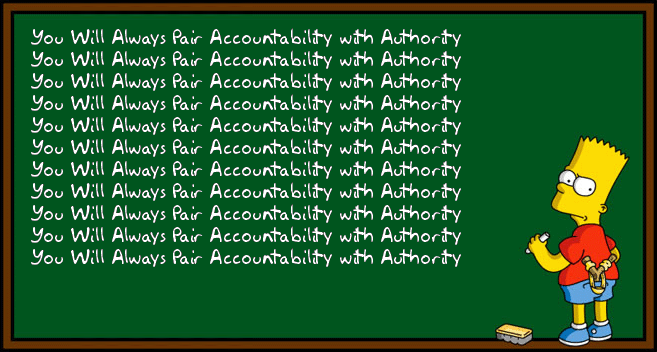When Everyone is Accountable, No One is Accountable – The Team Accountability Fantasy
By Michelle Malay Carter on December 16, 2007
 When?a project fails, people cover their tails trying to avoid being blamed.? (This sounds like it could be the beginning of a limerick, but I digress.)? One main reason projects fail in the first place is due to the failure to assign an accountable project leader.
When?a project fails, people cover their tails trying to avoid being blamed.? (This sounds like it could be the beginning of a limerick, but I digress.)? One main reason projects fail in the first place is due to the failure to assign an accountable project leader.
The Slippery Slope of Egalitarianism
The idea of an egalitarian work team is attractive upon first mention, but it fails miserably in practice.? When one person is not given the ultimate authority for the project, then one person does not have the ultimate power to decide critical issues along the way.? This opens the door to consensus-decision making which is time-consuming, emotionally charged, and lends itself to coalition building, sabotage, manipulation, withdrawal, etc.
All Advise, One Decides
With an accountable project manager, all team members are accountable to give their best advice, but the manager ultimately decides.? If a project leader does not have the last say in critical decisions, then the organization cannot ethically hold the project leader accountable for the project.
Accountability Must be?Matched with Authority?
Notice how accountability and authority are partners in this?? One without the other creates dysfunction.? Quite frequently, organizations expect accountability but do not equip their leaders with requisite authority.
Have you ever been asked to lead a project, but your team members felt free to ignore your meetings, your assignments, and your requests for information?? I have.? It’s a helpless feeling.? Helplessness breeds cynicism.? Is there any wonder why we are experiencing an employee cynicism epidemic?
In order to hold a?project leader accountable, the leader must have four requisite authorities in relation to the project.? A project leader must have the power to:
- Veto assignment of an unacceptable team member.
- Assign tasks (and have them carried out as if they were assigned by the team member’s manager.)
- Report on team member performance and effectiveness to the team member’s’manager.
- Remove a non-performing team member.
I believe project accountability would not be a problem if it were matched with these requisite authorities.? Explicit authority is an often overlooked but?critical resource organizations must provide to their leaders.
I’m OK.? You’re OK.? Let’s fix the system.
Have you ever been held accountable for something without being given the authority you needed to get the job done?
–Image created at Add Letters.
Filed Under Accountability, Employee Engagement, Executive Leadership, Managerial Leadership, Organization Design, Requisite Organization
